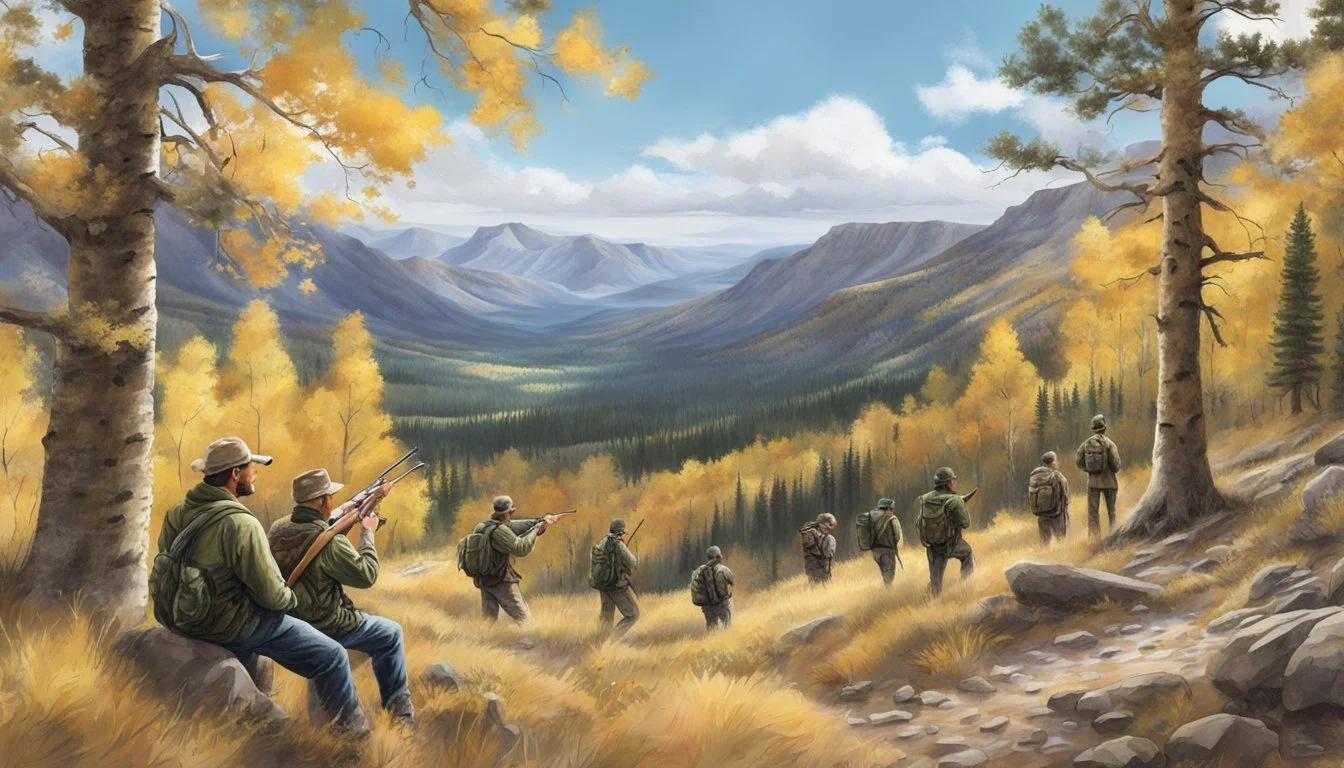Hunting Leases Colorado
Your Guide to Securing Prime Land
Colorado stands as a premier destination for hunters, offering an abundance of wildlife ranging from big game species such as elk, mule deer, and whitetail deer to small game and birds. The diverse terrains, including the Rocky Mountains and sprawling grasslands, provide a rich habitat that supports various game populations. With public lands becoming more crowded and hunting pressure increasing, many hunters seek private land opportunities to enhance their experience.
Hunting leases in Colorado provide hunters with exclusive access to private lands, often resulting in higher game numbers, better quality hunts, and a more solitary and immersive outdoor experience. Landowners benefit as well by generating additional income from their property while actively managing and conserving wildlife habitats. These agreements, tailored to the needs of both hunters and landowners, can range from short-term day leases to longer, season-long contracts.
As hunting leases in Colorado become increasingly popular, services and networks specializing in connecting hunters with available properties have surfaced, offering a variety of choices in terms of location, terrain, and the type of game available. Hunters can choose from leases encompassing vast tracts of native prairie with intricate creek systems and draws, or opt for smaller parcels that still offer rich hunting opportunities. With careful consideration and adherence to regulations set forth by Colorado Parks & Wildlife, hunting leases can provide an exceptional hunting experience while promoting conservation and respect for the state's natural resources.
Understanding Hunting Leases in Colorado
Hunting leases in Colorado offer hunters an exclusive opportunity to access private land for wildlife activities. They provide a structured agreement between the landowner and the hunter to ensure a mutually beneficial arrangement.
Benefits of Leasing Land for Hunting
Leasing land for hunting in Colorado provides several advantages:
Exclusive Access: Lessees typically receive exclusive hunting rights to the property, reducing competition and pressure from other hunters.
Improved Management: Hunters can benefit from landowners' wildlife management practices that may lead to healthier game populations.
Types of Hunting Leases
There are a variety of leases available:
Short-term leases allow access for a specific season or period.
Long-term agreements may span multiple years, providing consistency for hunters and landowners.
Regulations and Legal Considerations
Before entering a hunting lease, understanding the legal framework is essential:
Agreements must comply with Colorado's hunting regulations.
Insurance is often required to protect both the lessee and the landowner from liability.
Costs and Fees Associated with Leasing
The cost of hunting leases can vary widely based on several factors:
Location and size of the land can significantly affect price.
Lease duration also plays a role, with longer leases often equating to higher overall costs.
Species and Game Availability
Colorado boasts a rich variety of wildlife, offering hunters a diverse hunting experience. From the majesty of large elk to the ubiquity of various deer species, the state provides ample opportunities for hunters seeking different game.
Deer Hunting Opportunities
In Colorado, hunters can target both mule deer and whitetail deer. These species are prevalent across the state, with some areas offering more robust populations dependent on habitat conditions. Wildlife management efforts have resulted in sustainable herds that support annual hunting seasons.
Mule Deer: Known for their large, mule-like ears, they are commonly found in the rugged terrain of Colorado.
Whitetail Deer: While less common than mule deer, they are primarily available in the eastern plains.
Elk Hunting Seasons
The elk is one of Colorado's most sought-after game species, and the state offers various elk hunting seasons to accommodate different hunting preferences. Hunters relish the challenge of tracking elk during these designated times:
Archery: Early September to late September
Muzzleloader: Mid-September
Rifle: Four distinct seasons from early October to late November
Elk populations are carefully monitored to ensure a sustainable hunting experience, and specific zones may have varied availability.
Availability of Other Game Species
Beyond deer and elk, Colorado's diverse habitats are home to numerous other game species suitable for hunting:
Small Game: Includes waterfowl, turkey, and various furbearers.
Upland Bird: Encompasses species like dove and quail (What wine goes well with quail?).
Predators: Such as coyotes, which can often be hunted year-round.
Exotic Game: In certain areas, hunters may also find opportunities to hunt species classified as exotics.
The availability of these species can fluctuate based on the area, season, and conservation regulations. Hunters are encouraged to stay informed about the latest guidelines to ensure a responsible and legal hunting experience.
Location and Terrain
Colorado offers a diverse range of locations and terrains that are suitable for different types of hunting experiences. One can find a variety of habitats from grassy plains to mountainous regions, all providing unique hunting opportunities.
Popular Hunting Counties in Colorado
Adams County: Known for its native prairie and extensive creek systems.
Elk County: Offers a mix of public and private lands frequented by elk hunters.
Mule Deer County: Named for the mule deer population, this region has a number of private lands available for hunting leases.
These counties illustrate the variety of hunting locales available across the state of Colorado. Each county tends to have defined boundaries, where understanding property lines and respecting fences is crucial when hunting on private land.
Terrain Types and Hunter Accessibility
Grassy Plains: Open fields that may have easier access for hunters but can be challenging for spotting wildlife due to the lack of cover.
Mountainous Terrain: Rugged and can provide excellent hunting but often requires a good level of physical fitness and preparation for elevation changes.
Within Colorado's diverse landscape, hunters need to consider their own abilities and gear when selecting a lease to ensure it matches their accessibility requirements and hunting preferences.
Planning Your Hunting Trip
When organizing a trip, hunters must secure a suitable lease, ensure they have the necessary gear, and prioritize safety to optimize their experience.
Choosing the Right Lease
Selecting a lease is critical as it dictates the availability of game and the quality of the hunting experience. Factors such as location, price, and hunting types should align with one's budget and hunting goals. Colorado offers diverse leases, some with do-it-yourself options for experienced hunters, and others that might come with a guide for those looking for additional support. The prices of these leases vary significantly, with some as low as a few hundred to several thousand dollars per year.
What to Bring for Hunting
Proper preparation involves packing essential hunting gear tailored to the environment and prey. Here is a basic checklist for a hunting trip:
Firearm or bow: Choose based on the game you're pursuing and ensure it's sighted in.
Ammunition or arrows: Pack more than you expect to use.
Clothing: Bring layers and weather-appropriate attire.
Navigation tools: Maps, compass, or GPS device.
First-aid kit: Always be prepared for emergencies.
Camping gear: If staying overnight, include a tent, sleeping bag, and cooking utensils.
Valid hunting license: Confirm it's current and for the correct state and species.
Safety and Preparation Tips
Safety is paramount, and preparation is the key. Hunters should be well-versed in firearm safety and understand the specific regulations of Colorado hunting. They should also inform someone about their hunting location and expected return time. Weather in Colorado can change rapidly, so it's advisable to check the forecast and carry appropriate survival gear. Hunters should also be familiar with the terrain and wildlife of their lease area to avoid potential hazards.
Accommodations and Facilities
Hunting leases in Colorado offer a range of accommodations and facilities to enhance the outdoor experience. Whether hunters prefer the rustic appeal of camping or the comfort of lodgings, the leases cater to various preferences while providing essential amenities.
Camping and Lodging Options
Camping options on Colorado hunting leases often include designated areas where hunters can set up tents or park recreational vehicles. These sites provide a direct connection to nature, allowing hunters to immerse themselves in the wilderness. Some leases offer lodges or cabins that come fully furnished, providing a comfortable stay with basic utilities such as electricity and running water. Accommodations differ in capacity, but many maintain exclusivity for single groups to ensure a secluded and intimate hunting experience.
Facilities and Amenities on Leased Lands
On leased lands, hunters can generally expect a set of basic amenities to support their stay. Facility offerings can include:
Access to water: Dams or natural water bodies may be available for use.
Forest management services: Some leases provide assistance or advice for navigating the hunting terrain.
E-Scouting Tools: Aid in planning and maximizing hunting opportunities.
Additionally, certain leases allow the presence of dogs for hunting companionship or assistance, enhancing the hunting experience. Every lease has different rules regarding pets, so it is vital to confirm beforehand.
Supporting Local Communities
Hunting leases in Colorado not only provide hunters with access to prime lands but also play a vital role in supporting local communities. When hunters lease private lands, they contribute directly to the financial wellbeing of landowners.
Local Businesses: The influx of hunters needing supplies, lodging, and other services greatly benefits local businesses. As hunters participate in seasonal activities, they often purchase gear, food, and gas from nearby vendors, injecting funds into the local economy.
Landowners: For those who own land in Colorado, hunting leases present a valuable source of income. This financial boost can contribute significantly to a landowner's livelihood, particularly in rural areas where other economic opportunities may be limited.
Economies: The symbiotic relationship between hunters and local economies is noteworthy. Money spent on leases circulates through the community, aiding in the stability and growth of local economies. Here is a brief outline of the economic flow:
Step Economic Contribution 1 Payment for leases 2 Landowner expenditures within the community 3 Business revenue from hunter spending 4 Enhanced services due to increased demand
Community Support: By choosing to lease land for hunting, hunters demonstrate a commitment to rural development. Their contributions help maintain the viability of local lands and provide incentives for land conservation practices that benefit the community as a whole.
In essence, hunting leases are more than just contractual agreements for outdoor activities; they are investments in the welfare of local communities across Colorado.
Membership and Exclusive Access
Hunting leases in Colorado are a means for enthusiasts to gain exclusive access to prime hunting grounds. These leases provide a structured system wherein members can enjoy hunting privileges that might not be available to the general public. For those seeking a more premium experience, becoming a premium member of a hunting club or organization can offer additional benefits, such as exclusive hunts and early access to lease information.
Exclusive Hunts: Premium members often have the opportunity to participate in hunts that are not open to non-members. These exclusive hunts can encompass a variety of game and are typically held on well-managed private lands, which can lead to a more successful and enjoyable hunting experience.
Hunting Land for Lease: A significant advantage offered by membership is the access to vast acres of private hunting land for lease. With this access, members are afforded the chance to hunt in less crowded environments, increasing their chances of a successful hunt.
Number of Hunters: To ensure a high-quality experience, leases often restrict the number of hunters allowed on the property at one time. For example, certain properties may limit it to four hunters maximum, thus ensuring a less pressured hunting environment.
Members looking to secure a lease should keep in mind these key points:
Premium Membership can lead to more exclusive hunting opportunities.
Exclusive Leases grant access to well-managed private properties.
Limited Numbers ensure a quality, uncrowded hunting experience.
This tailored approach to hunting access through memberships ensures that hunters are provided with a clear, confident, and structured hunting experience.
Professional Guidance and Hunting Tips
When venturing into the vast Colorado landscape for hunting, one should consider professional guidance to ensure both success and safety. Professional outfitters can offer invaluable advice tailored to the Colorado terrain, from dense forests to open grasslands. They help hunters understand regional wildlife patterns, crucial for a fruitful hunting trip. Here are key tips provided by seasoned professionals:
Scout the Area: Before the hunting season begins, it is wise to familiarize oneself with the chosen lease. Knowledge of water sources, animal trails, and feeding areas can dramatically increase one's success rate.
Safe Hunting Practices: Maintaining a safe environment is paramount. Professional guides stress the importance of wearing bright colors for visibility and strictly adhering to safety protocols while handling firearms.
Local Ecology: A deep understanding of the local ecology is necessary. Guides often share insights on the habitats of various game species, which is essential for ethical and selective hunting.
Proper Equipment: Use of the correct equipment for the Colorado environment cannot be understated. Professionals suggest gearing up with sturdy boots, camouflage attire, and suitable weather gear.
Ethical Hunting: Experienced guides encourage ethical hunting practices. They advocate for a controlled environment where game populations are managed sustainably and the land is respected.
To ensure a comprehensive hunting experience in Colorado, one may seek professional hunting guides who provide personal insights and advance one's skills in a controlled and respectful manner. They offer an indispensible layer of knowledge that can transform a hunting lease into a responsible and rewarding adventure.
Role of Hunting in Conservation
Hunting leases in Colorado serve a pivotal role in conservation efforts. They establish a symbiotic relationship where wildlife management and habitat conservation are funded primarily by the hunters themselves. Hunters contribute financially through lease agreements which often include conditions that promote a healthy ecosystem.
Landowners who offer hunting leases are motivated to maintain robust animal populations and a safe environment for both the wildlife and hunters. The income generated from the leases incentivizes the preservation of natural habitats. Such an approach ensures that the land remains undeveloped and that ecosystems thrive, which in turn supports diverse wildlife populations.
Financial Contributions
Lease fees directly support habitat conservation.
Funds from hunting licenses are allocated to wildlife management initiatives.
Wildlife Populations
Regulated hunting prevents overpopulation.
Hunters help maintain a balanced ecosystem.
Landowner Stewardship
Landowners manage the land to support healthy wildlife habitats.
Safe hunting practices are promoted to protect both wildlife and people.
Safe and ethical hunting is encouraged, with strict adherence to regulations that ensure sustainable harvests. Through these measures, hunting leases have a positive impact not only on the conservation of wildlife but also on the ecologically responsible use of land. Thus, hunting leases are more than just agreements for recreational activity; they are critical components in the cycle of conservation.





